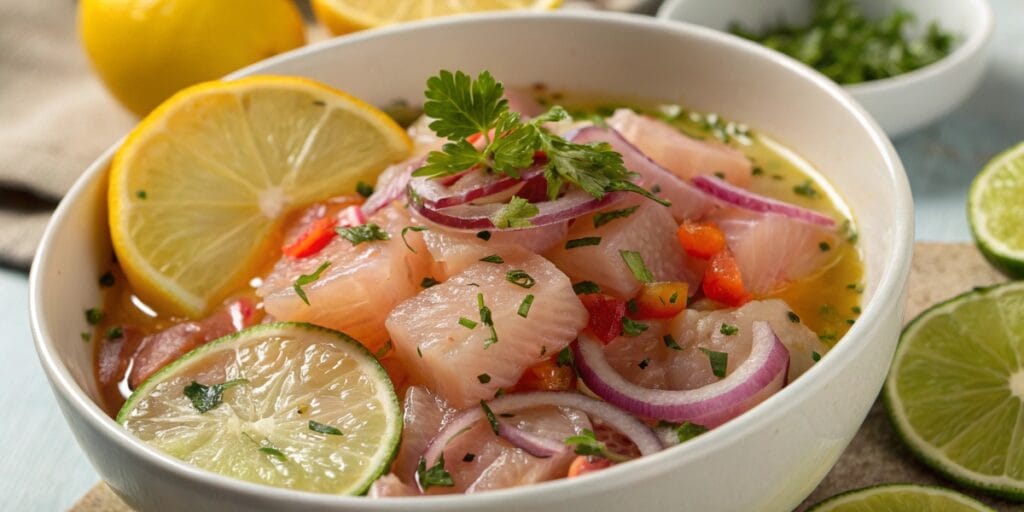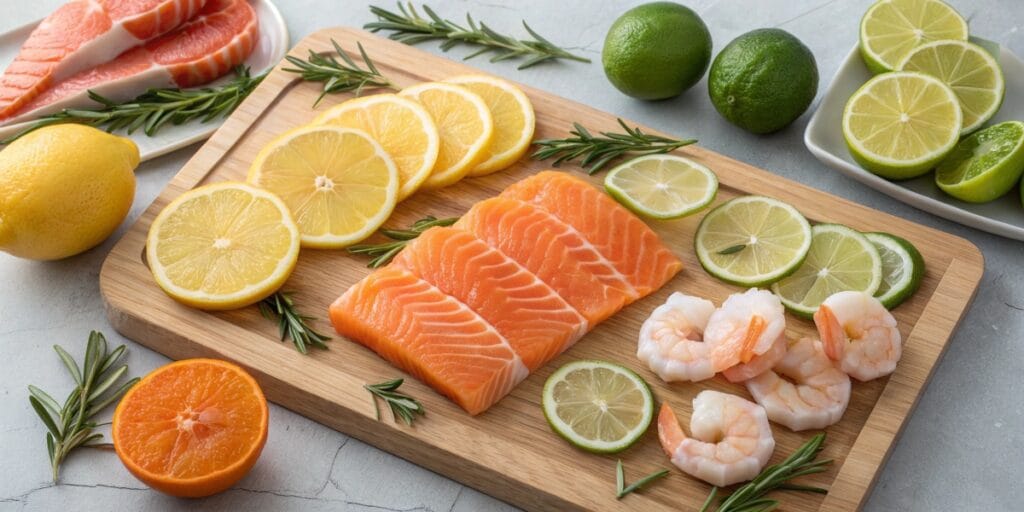What Does Lemon Juice Do to Seafood?
Lemon juice has long been a favorite addition to seafood dishes, but what does lemon juice do to seafood? Beyond its tangy flavor, it transforms seafood through its chemical properties, enhancing texture, aroma, and taste. In this article, we dive into the science, culinary applications, and benefits of lemon juice with seafood. To learn more about complementary flavors, check out our guide on classic seafood pairings.
The Chemistry Behind Lemon Juice and Seafood
The secret of lemon lies in its acidic properties, which impact seafood in the following ways:
- Denaturing Proteins:
- Lemon juice contains citric acid, which lowers the pH of seafood surfaces. Consequently, this process denatures proteins, changing the seafood’s texture and giving it a “cooked” appearance. For example, ceviche uses this reaction to prepare seafood without heat. Explore more techniques in our ceviche preparation guide.
- Neutralizing Odors:
- Additionally, the acid in lemon juice breaks down amines, compounds responsible for fishy smells. As a result, this leaves seafood smelling fresh and appetizing.
- Firming Texture:
- Moreover, lemon juice lightly firms delicate seafood like shrimp and scallops, enhancing their mouthfeel.
- Enhancing Freshness:
- Its antibacterial properties, therefore, slow down bacterial growth, helping to keep seafood fresher for longer.
Culinary Applications of Lemon Juice in Seafood
Lemon juice isn’t just a flavor enhancer; it’s a versatile tool in the kitchen. Consequently, its uses extend to many techniques:
- Marination:
- Marinate seafood for 15-20 minutes (thin cuts) or up to an hour (thicker cuts) to infuse flavor and tenderize without over-softening. Learn more about the science of marination in our marination techniques guide.
- Cooking Without Heat:
- In ceviche, the acidity of lemon juice “cooks” seafood, transforming its color and texture. Find traditional ceviche recipes in our ceviche cooking guide.
- Flavor Balancing:
- Furthermore, a squeeze of lemon juice balances the richness of fatty fish like salmon or mackerel.
- Visual Appeal:
- Lemon wedges or zest add vibrant color and an air of freshness to seafood presentations.
- Complementing Shellfish:
- Additionally, pairing lemon juice with shrimp, crab, or lobster highlights their natural sweetness.
Lemon juice also stars in sauces like lemon butter and citrus vinaigrettes, elevating seafood’s flavor profile. Discover how to craft these sauces in our seafood sauce guide.
Historical and Cultural Significance
Lemon and seafood have a rich history, rooted in centuries of culinary traditions:

- Mediterranean Origins:
- Mediterranean cuisines were among the first to pair lemon with seafood, valuing its preservative and flavor-enhancing qualities. Explore iconic Mediterranean seafood dishes in our Mediterranean seafood guide.
- Global Adoption:
- From the ceviche of Latin America to French lemon-butter sauces, lemon juice is a global favorite.
- Ancient Uses:
- Historically, lemon juice was used to preserve fish during long voyages, thanks to its antibacterial properties.
- Modern Trends:
- Today, chefs experiment with other citrus fruits, like lime and orange, for new and innovative seafood flavors.
Health Benefits of Lemon Juice in Seafood: What does lemon juice do to seafood
Adding lemon juice to seafood not only enhances taste but also boosts nutrition. Consequently, it offers these health benefits:
- Vitamin C:
- Lemon is rich in vitamin C, which supports immune health and improves the absorption of iron from seafood. Learn more about the nutritional benefits of citrus fruits in our citrus nutrition guide.
- Digestive Aid:
- Citric acid stimulates digestive enzymes, making seafood meals easier to digest.
- Reduced Sodium:
- Lemon juice adds flavor without the need for excessive salt, making it a heart-healthy choice.
- Antibacterial Properties:
- Lemon juice’s acidity helps inhibit bacterial growth, keeping seafood fresh.
- Skin Health:
- The antioxidants in lemon juice support collagen production, benefiting skin health.
- Weight Management:
- Furthermore, it is low in calories, making it a flavorful addition to seafood dishes for those watching their weight.
Practical Tips for Using Lemon Juice with Seafood
Follow these tips to maximize the benefits of lemon juice:
- Timing:
- Add lemon juice near the end of cooking to preserve its fresh flavor.
- Combine with Herbs:
- Pair lemon with dill, parsley, or garlic for an elevated taste.
- Experiment with Citrus:
- Mix lemon juice with lime or orange for unique flavor combinations.
- Avoid Overuse:
- Use sparingly to avoid overpowering the dish.
- Use Fresh Lemons:
- Freshly squeezed lemon juice delivers better flavor than bottled alternatives.
For a deeper dive into cooking techniques, explore our seafood cooking timeline.
Frequently Asked Questions about What does lemon juice do to seafood
- Does lemon juice cook seafood?
- Yes, citric acid denatures proteins, giving seafood a cooked texture. (Learn More)
- How long should seafood marinate in lemon juice?
- Thin cuts: 15-20 minutes; thicker cuts: up to an hour.
- Can I use other citrus juices?
- Yes, lime, orange, and grapefruit juices offer distinct flavor profiles.
- Does lemon juice remove fishy smells?
- Yes, it neutralizes amines, leaving seafood fresh and odor-free.
- Is lemon juice safe for raw seafood?
- While it denatures proteins, it may not eliminate all pathogens. Use fresh, high-quality seafood for dishes like ceviche.
- Why is lemon juice better than vinegar for seafood?
- Lemon has a milder acidity and a fresh, citrusy aroma that complements seafood.
- What happens if I use too much lemon juice?
- Excess lemon juice can overpower the dish. Use it sparingly for balance.
- How does lemon juice preserve seafood?
- The acidity creates an environment that inhibits bacterial growth, helping seafood stay fresh longer.

Conclusion: What does lemon juice do to seafood
Lemon juice is indispensable in seafood preparation, offering enhanced flavor, improved texture, and numerous health benefits. Its versatile applications make it a staple in both traditional and modern recipes. For more inspiration, check out our seafood and citrus pairing guide.
Whether you’re garnishing grilled fish, marinating shrimp, or preparing ceviche, lemon juice is the perfect ingredient to elevate your seafood dishes. Moreover, its timeless appeal and culinary importance ensure it remains at the heart of seafood cuisine for generations to come.
With its versatility, lemon juice continues to enrich traditions while adapting to modern tastes. From simple grilled fish to complex ceviche, its importance is undeniable. Incorporate lemon into your seafood recipes and experience the vibrant, tangy transformation it brings to every dish.

